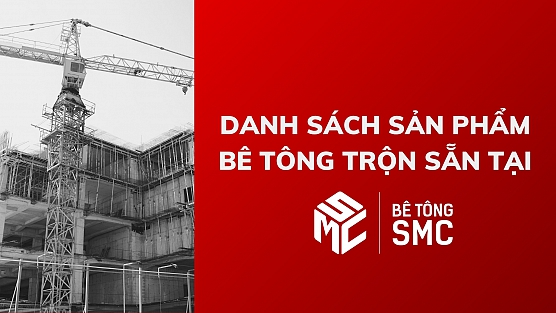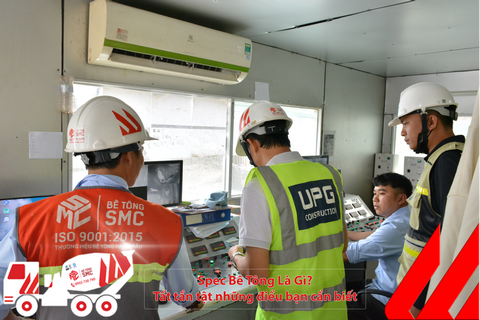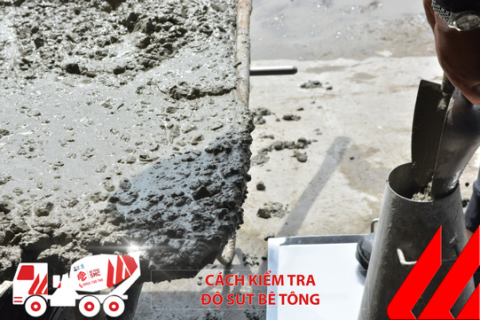Frequently asked Questions
Concrete engineering advice
Business contact
How Long Does Cement Take to Dry? (Guide for Quick Cement Drying)
Do you need to know how long it takes for cement to dry completely? Optimize the drying process by controlling the environment, using reinforcing additives, and adhering to the mixing process. For humid environments or rainy weather, cover the cement or use dryers. Additives can help speed up the drying process and other methods. Explore the article "How Long Does Cement Take to Dry?" at SMC Concrete for more useful information.
1. Why is it important to keep cement and concrete dry?
To ensure the durability of construction projects, concrete structures need to achieve hardness and load-bearing capacity. Cement, due to its water-absorbing properties, can harden when reacting with water over a certain period. However, to achieve optimal dryness, hardness, and load-bearing capacity, this process must comply with technical standards.
Concrete only achieves the best quality when cured in an environment with appropriate humidity and is not affected by external conditions. Surface observation of concrete is insufficient to assess hardness, as the hydration process within the concrete mass continues even if the surface appears dry. Therefore, maintaining stable humidity over a prolonged period ensures maximum strength and the best concrete quality.

2. How long does cement take to dry?
Cement is a crucial component in the construction of concrete and other building projects. When used in construction, a common question is: How long does cement take to dry completely? The drying time of cement depends on various factors, including weather conditions, environmental humidity, and composition.
Under stable weather conditions, the drying time for cement typically ranges from 7 to 14 days. However, in high humidity or rainy seasons, the drying process may take longer. Conversely, in sunny and dry conditions, the drying time can be shorter than usual.
Example:
In the rainy season, when humidity is high, cement requires a longer time to dry completely. Assuming the normal drying time is 10 days, during an extended rainy season, this period might increase to approximately 14 to 21 days.
In contrast, in sunny and dry seasons, the drying time can be reduced to about 5 to 7 days.
To ensure cement dries completely before continuing construction work, patience and adherence to procedures are crucial. Especially in unstable weather conditions, using protective measures like covering or dryers can help accelerate the drying process.
To understand the factors affecting the drying process and procedures for faster drying of concrete or cement on site, refer to the following section.

3. Guide for Quick Cement Drying
In this section, we will guide you on how to dry cement quickly under various weather conditions.
Commonly used types of cement:
Mortar: A mixture of cement, water, and sand forms mortar, which blends and dries within about 20 minutes to 1 hour. Due to its smooth and quick-drying nature compared to concrete, it is easily used as an outer layer in construction. However, because it does not mix with gravel, mortar does not have sufficient hardness and durability over time.
Concrete: A mixture of cement, water, sand, and gravel forms concrete, which takes about 1 day to dry and 3 to 4 weeks to achieve optimal quality. Proper drying of cement is crucial to ensure the durability of concrete structures. Controlling humidity, adhering to the mixing process, and using reinforcing additives help achieve optimal hardness, dryness, and load-bearing capacity. Proper drying ensures the quality and durability of construction projects, providing safety and satisfaction for investors and project owners.
If you are looking for companies, factories, suppliers of commercial concrete, or premium pumping services, do not hesitate to leave your information in the [CONTACT] section for the earliest support.
SMC Concrete has established its brand as a leading supplier of concrete with guaranteed quality and progress. At SMC, we are committed to delivering exceptional value in quality and service to our customers.
Other news
Currently, ready-mix concrete is a top choice for many construction projects—both large and small—thanks to its convenience, consistent quality, and high construction efficiency. With extensive experience supplying commercial concrete for numerous key projects in the Southern region, SMC proudly offers a diverse range of ready-mix concrete products to meet the technical requirements of every type of construction.
A Comprehensive Guide to Concrete Specs – Everything You Need to Know
A Complete Guide to Concrete Specs – a set of technical parameters including concrete grade, slump, compressive strength, aggregate size, and mix ratio. This article helps you understand how to define, apply, and control concrete quality according to TCVN standards and practical construction conditions.
How to check the concrete slump
In construction and civil engineering, concrete slump test (or simple slump test) is the work performed at the construction site or in the laboratory that usually determines and measures the hardness, consistency of samples. Concrete before pouring concrete or casting maintenance, research or experiment samples.




